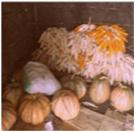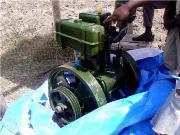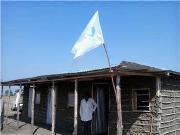South Sudan: Environmentally Sound Agriculture
Piotr Barczak (Poland/Belgium/South Sudan) took several community-based adaptation courses in 2012 but was called away to South Sudan in the fall. Poitr is an environmental lobbyist in Brussels – but also has experience working in the DRC.
I was very pleasantly surprised to get this note from him a few days ago and wanted to share it with the CSDi community at large.
He has been working on a project for the past two months in South Sudan developing an ecologically sensitive agricultural program for 60 farming families. He is also said in his note that he will prepare a brief final report in English in March for those of us in the CSDi to enjoy. I will include a few photos below but I will make a link to his report in Polish so that you can look at a greater range of photographs. I will let Piotr tell his story now.
Dear Professor Magee,
I wanted to write this letter long time before. I want to thank you for your lessons and courses that I did last months.
Indeed it helped me a lot in getting into a very interesting project in South Sudan. I have been here already over 2 months and in two weeks I will finish. I will write a small report in English and I will share it with the CSDi Community.
So, I work for the Polish Humanitarian Action as an FSL Project Coordinator. I am responsible for arranging a farmers community.
All is fine, I am amazed how much I could do here during these two months, I came in a right moment, dry season started so many people looked for work so it was easy to find subcontractors. Anyway, we are creating a nice community of farmers here. They will receive a big plot of land – 19 ha, already cleared and leveled, well drained – that was part of my job. Installation of irrigation is still pending. tomorrow we start a 3-day training on vegetable growing. All the beneficiaries (60 farmers) will receive know -how, seeds and tools to use their 40x40meters plots (more that enough to feed their families). so the farm will be provided with water during dry season, and will be drained during rainy season.
| Stored Staples |
|
 |
As we also do WASH programs the installation of toilets will be here as well. I have managed also to encourage local government to put one bore-hole deeper in the village so they could get clean water without walking over 45 minutes to the nearest well. |
| Water Pump |
|
 |
An environmental approach is extremely important for me in this project. I made modifications in it in order to continue this farm without any tractor plowing, no pesticides and fertilizers. In place of that I am explaining to people here (beneficiaries, local government and even other NGOs who just think that any development is good, no matter if eco-friendly or not), that ever-green agriculture with agro-forestry and permaculture is actually a solutions for sub-saharians problems. It is not an easy job. I did not come here to lobby but to proceed! But apparently without putting all that in a good picture in the beginning the sustainable development in this country will be very difficult in the future. |
| Seeds |
|
 |
Well, I am coming back in March to Brussels and I am very happy for that. I believe will leave the community here already well prepared and well equipped so they could proceed on their own – their engagement is the key to all this project. So I believe I must leave, to search for another place where I could contribute. But still – almost one month to go! many challenges! The infrastructure here almost does not exist. I would say it is even worse than what I have seen in DRC. |
|
|
|
|
Headquarters
|
|
 |
Almost all the business is taken by Kenyans/Ugandans/Ethiopians and other. There is also little security here, local tribe fights for cows in Jonglei state (where I live) and of course continuous war with Sudan over the border and oil fields. But there is a light of hope! as everywhere. Those pastoralist communities are very eager to settle and start farming. They are tired of super high prices of food imported from neighboring countries. |
They also understand that UN food distributions will not support them forever. So, this is where we start, and soon I finish, to check it next year how are they doing! fingers crossed!
So, After my coming back to Brussels I will continue a job as an environmental lobbyist but I wish to continue the course at CSDi online. Which one do you propose to me now?
Kind Regards
Piotr Barczak
Poland/Belgium/South Sudan
You can download his full project report here:
Piotr Barczak South Sudan Report
Would you like to learn how to develop Community Based Adaptation Projects?
Please write us with your stories, thoughts and comments through Online.Learning@csd-i.org

One comment